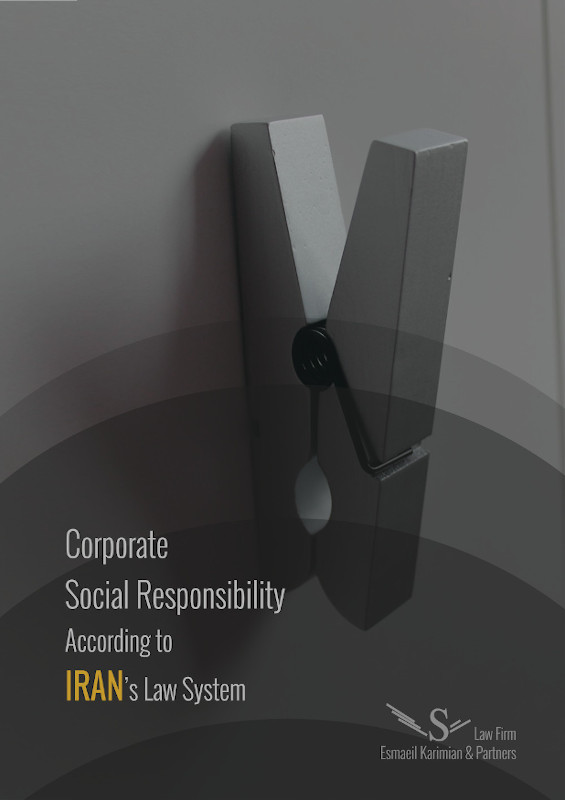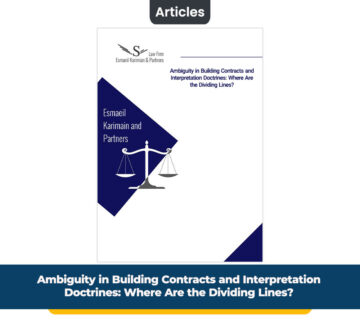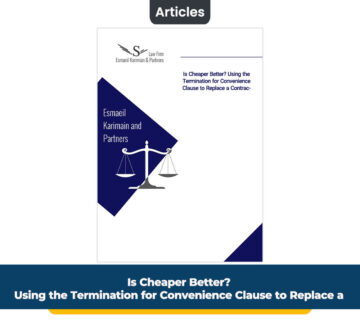In this article you will read:
1. Introduction
In our previous newsletters and our firm’s books dedicated to Investment Law, we humbly tried to describe investors’ advantages and rights considering Iranian law system. In order to achieve a general transparent precise vision of investment in Iran any investor has to known envisioned “legal obligations”.
There is no certain provision dedicated to this subject which could be addressed as reference for corporate social responsibility in Iranian acts, however just like any other law system, there are several obligations binding companies.
It should be noted that some important labour-related obligations, environmental obligations, consumers-related obligations, anti-money laundering obligations are briefly expressed as follows:
2. Labour-related Obligations
Minimum wage, minimum time of leave, certain working situation for teenagers and women, acceptable termination of labour contract, certain share of Social Security Insurance, and liability insurance are some of the most important obligations in this aspect as follows:
¢ Minimum Wage: According to Article 41 of Labour Act, it’s forbidden to pay less than the minimum wage which is ratified every year by the Labour Supreme Council.
¢ Minimum Time of Leave: There are 4 types of leave in Iranian Labour Law; Entitled Leave, Treatment Leave, Childbirth Leave, and Non-Paid Leave.
¢ Certain Working Situation for Teenagers and Women: In Section 3 of Labour Act, 2 chapters have been dedicated to determine certain working situation for teenagers and women such as prohibition of [assigning] harmful [tasks] to them (Article 75 of Labour Act), prohibition of employing individuals under 15, and obligatory medical tests for the workers who are between 15 to 18.
¢ Acceptable Termination of Labour Contract: The termination of labour contract must be in compliance with Chapter 3 of Section 2 of Labour Act (especially Article 21) which has determined the circumstances in which both parties or one party of an employment contract can terminate their contract.
¢ Certain Share of Social Security Insurance: Article 28 of Social Security Insurance obliges employers to pay 20 % of total 30 % of an employee wage to Social Security Organization.
¢ Liability Insurance: According to Article 13 of Civil Liability Act, employers are obliged to insure their workers (employees) in the matter of harms made to a third party. Although this obligation is specified in the Civil Liability Act, there is no asserted legal penalty for disobedience. It should be noted that insuring workers in the matter of harms made to a third party can severly reduce the risk of being sued in these affairs.
3. Environmental Obligations
Provisions such as Environment Protection and Refinement Act, The Manner of Preventing Air Pollution Act, and Waste Management Act have foreseen several obligation for different institutions including companies.
¢ Obligations Asserted by Environment Protection and Refinement Act: According to this act, vast areas can be named as “National Parks”, “Protected Areas” and Etc, however this authority must not lead to infringement of private properties and ownership rights. According to Article 11 of this act, Environment Protection Organization can prohibit the factories and workshops that cause environmental pollution if they don’t follow the instruction related to this pollution issued by the organization.
¢ Obligations Asserted by The Manner of Preventing Air Pollution Act: Based on this act, the source of air pollution are divided into three groups: 1. Transportation Machines, 2. Factories, Workshops, and Power Stations, 3. Commercial [Retailers and Service providers], Households, and Others. The prohibition of using old machines, using specified filters in machines, the authority to determine traffic schemes, the obligation to allocate space and budget for planting trees and green areas in Industrial Areas are some of the referred obligations.
¢ Obligations Asserted by Waste Management Act: According to this act and its regulation, waste is divided into five groups: Normal, Medical, Particular, Agricultural, and Industrial. Each one of them must be stored, moved, destroyed or recycled in a specific manner and waste producers such as factories, workshops, hospitals, offices (any service provider) are obliged to follow the procedures which are prescribed in these provisions.
4. Consumers-Related Obligations
According to Consumers Protection Act, service providers and goods manufacturers are obliged to obey principles and duties such as: General responsibilty for products (goods or services) correctness (Article 2), revocation right for goods [and service] consumers if certain requirement have not been met (Article 2), guarantee receipt issuance and providing its following services (Article 3), providing the required information on how to use a product (Article 3), liability and punishment for defective products (goods or services) (Article 16 & 18).
It might be intersting to know that based on Article 9, an association called the Association for Protection of Consumers’ Rights is formed which has the right and duty to follow up consumers’ complaints on their behalf.
5. Anti-Money Laundering Obligations
In 2015, Iran was placed in the blacklist of Financial Action Task Force and was required to change some of its enactments. Iran’s cabinet has faced big challenges to get F.A.T.F related conventions and recommendations ratified by the parliament but finally achieved this goal and waits for the Expediency Discernment Council to finalize this ratification. Beside International conventions, Iran’s parliament has ratified an act called “Fighting Money Laundering Act” which binds individuals and legal persons to expose theirs income source, forbids them from keeping more than 10000 € more than 6 months (these numbers are determined by Central Bank of Iran with issuing an instruction and might change) [except for commercial matters] and specified circumstances explained in these provisions. Since anti money laundering obligations are complex and must be expressed carefully, it will be amplified in another newsletter.





No comment